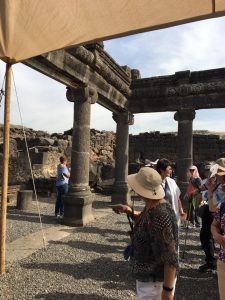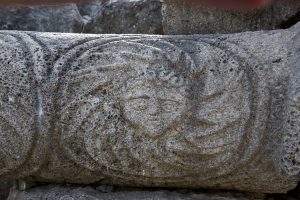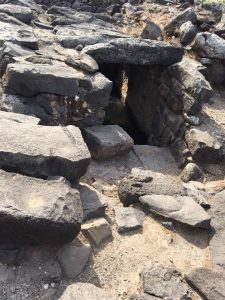 Jesus said this of first century Chorazin:
Jesus said this of first century Chorazin:
Woe unto thee, Chorazin! woe unto thee, Bethsaida! for if the mighty works, which were done in you, had been done in Tyre and Sidon, they would have repented long ago in sackcloth and ashes. But I say unto you, It shall be more tolerable for Tyre and Sidon at the day of judgment, than for you (Matthew 11:21).
It stirred my soul to think I was standing in the place where many “mighty works” of the Lord were done. The synagogue that we viewed was from the 3rd and 4th centuries, but some of the ruins surrounding it date back to the first century.
Several things are memorable to the Christian viewing the ruins of Chorazin. I’ll always be able to revisit , in memory, the synagogue we saw because the words just kept echoing in my mind “Woe unto thee, Chorazin!” This city that summarily rejected the clear evidence that Jehovah was among them now lies in utter ruin. One has to reflect on the truth that the ruin of the architecture has little significance when compared to the eternal ruin and destruction of thousands of souls living in Chorazin during and after the earthly life of the Master Miracle-worker; souls who were so close to the physical evidence of God among them, but turned a blind eye to what was obviously supernatural.
One has to reflect on the truth that the ruin of the architecture has little significance when compared to the eternal ruin and destruction of thousands of souls living in Chorazin during and after the earthly life of the Master Miracle-worker; souls who were so close to the physical evidence of God among them, but turned a blind eye to what was obviously supernatural.
I’ll always remember the seat of Moses in that synagogue, because of the words of the Lord:
The scribes and the Pharisees sit in Moses’ seat: All therefore whatsoever they bid you observe, that observe and do; but do not ye after their works: for they say, and do not. For they bind heavy burdens and grievous to be borne, and lay them on men’s shoulders; but they themselves will not move them with one of their fingers. But all their works they do for to be seen of men: they make broad their phylacteries, and enlarge the borders of their garments, And love the uppermost rooms at feasts, and the chief seats in the synagogues, And greetings in the markets, and to be called of men, Rabbi, Rabbi. But be not ye called Rabbi: for one is your Master, even Christ; and all ye are brethren (Matthew 23:2-8).
 This seat of Moses was elaborately carved of stone and, from it, the law was regularly read by those who were living symbols without substance; proclaiming one thing and doing another. In fact, by the time of the worship of the era we were viewing, the rejection of the Messiah had been persisting in this place for three centuries. The Jews who sat in Moses seat in this place could have read the gospel of Matthew, where the warning about their hypocrisy was given by Christ himself. But they were uninterested in the Messiah, having rejected the powerful testimony—even the resurrection—of the One who gave the stern warning to the residents of the specified town of Chorazin.
This seat of Moses was elaborately carved of stone and, from it, the law was regularly read by those who were living symbols without substance; proclaiming one thing and doing another. In fact, by the time of the worship of the era we were viewing, the rejection of the Messiah had been persisting in this place for three centuries. The Jews who sat in Moses seat in this place could have read the gospel of Matthew, where the warning about their hypocrisy was given by Christ himself. But they were uninterested in the Messiah, having rejected the powerful testimony—even the resurrection—of the One who gave the stern warning to the residents of the specified town of Chorazin.
I saw the Medusa head, one of few preserved, since most of them were apparently  destroyed when the Jews returned to periods of stricter observance of the law; and I observed the underground bath house. Looking at the ruins of the houses in the center of the city, I could see that they were in rows and that families lived in close proximity to one another. I imagined Jewish children running across the narrow lanes and traveling with their parents to the synagogue on the Sabbath. I pondered the tragedy that finally overtook these children when their synagogue and civilization was finally destroyed, likely by an earthquake, in the fourth century. I grieve, even as I write, to understand that many of them died along with their parents on that awful day. I saw the “ghosts” of the innocents clinging to their parents as the earth enveloped them. I heard the screams and the crashing of stones. But to think that those hundreds of adult deaths were the launching points to eternal death and separation from God, is unspeakably difficult to contemplate. Blessed were those, on that day, who were children and separated, at that moment, eternally from the everlasting punishment to be endured by those parents who had rejected the Messiah.
destroyed when the Jews returned to periods of stricter observance of the law; and I observed the underground bath house. Looking at the ruins of the houses in the center of the city, I could see that they were in rows and that families lived in close proximity to one another. I imagined Jewish children running across the narrow lanes and traveling with their parents to the synagogue on the Sabbath. I pondered the tragedy that finally overtook these children when their synagogue and civilization was finally destroyed, likely by an earthquake, in the fourth century. I grieve, even as I write, to understand that many of them died along with their parents on that awful day. I saw the “ghosts” of the innocents clinging to their parents as the earth enveloped them. I heard the screams and the crashing of stones. But to think that those hundreds of adult deaths were the launching points to eternal death and separation from God, is unspeakably difficult to contemplate. Blessed were those, on that day, who were children and separated, at that moment, eternally from the everlasting punishment to be endured by those parents who had rejected the Messiah. 

The bath house.
When the Lord issues a “woe”, the hearer (or reader) had best hearken to the warning! How are we doing on finding and heeding the warnings given in the New Testament for us today? It’s an eternally important challenge. Another sobering way to ask this is: If my life tragically and suddenly ended today, would it be better if I’d died in childhood?
